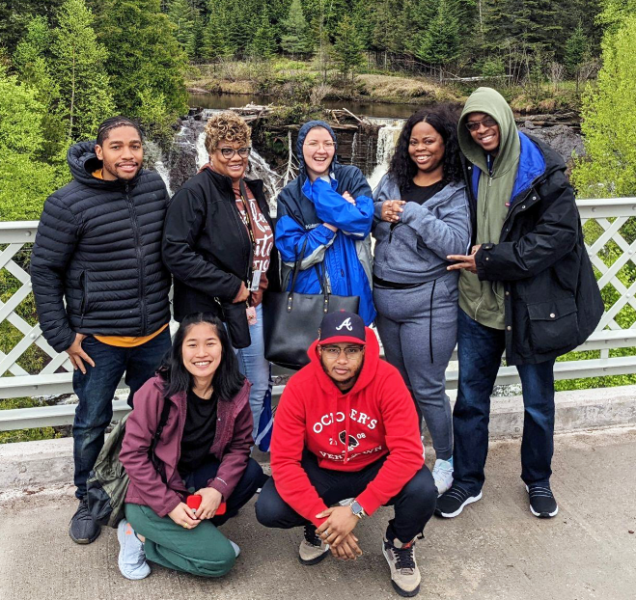
The best approach to succeeding in STEM disciplines is to learn by doing. And this summer, a cohort of community college students did just that through the Michigan Tech MiCUP (Michigan College and University Partnership) program. Three of those students were mentored by College of Computing faculty.
The MiCUP students spent seven weeks on campus, working on a research project\ one-on-one with their faculty mentor and learning what it’s like to live and study on a university campus.
MiCUP funds housing and meals in a Michigan Tech residence hall, a scholarship for a 1-credit University summer course, a stipend, and an opportunity to develop a professional research poster with a faculty member.
The program aims to help make the transition to a four-year university an achievable goal for low-income students and students who are the first in their families to attend a four-year college.
Marco Britton
Marco Britton, a second-year student majoring in cybersecurity at Wayne County Community College, was mentored by Yu Cai, a professor of cybersecurity in the Department of Applied Computing. Titled “Raspberry Pi – A Tool For Cybersecurity,” Marco’s project aimed to demonstrate how Raspberry Pi can be used as an introductory tool for learning cybersecurity, particularly for college and K-12 students.
Raspberry Pi is a low-cost, credit-card-sized computer that enables the exploration of computing and learning how to program in languages like Scratch and Python. To demonstrate Raspberry Pi coding capabilities, Marco developed a clicker game using Scratch, a platform that allows use of building blocks, animation, and graphics to write games and programs. He also developed a dice game to demonstrate Raspberry Pi coding capabilities using Python, a language for writing scripts and automated programs.
And he coded a wireless signal scanner to build a dummy Wi-Fi network, monitor network traffic, and crack Wi-Fi network passwords using AirCrackNg, a tool that monitors wireless signals, cracks passwords, and hacks into wireless networks.
Marco also investigated password security, interviewing students and faculty members, and discovering that using the same passwords on multiple websites is a common security vulnerability.
“Marco is self-motivated and very interested in cybersecurity,” says Cai. “He has a clear vision for his future career pathway.”
“I have gotten tremendous help from Professor Yu Cai and his graduate student, Brandon Cox,” writes Marco on his research poster. “They are very knowledgeable, patient, and friendly. I would also like to thank the MiCUP program for giving me the opportunity to learn more about cybersecurity at Michigan Tech.”
Alec Mirambeau
Alec Mirambeau, a computer science major at Grand Rapids Community College, worked with Leo Ureel, an assistant professor of computer science.
For his MiCUP research, Alec explored computational methods to automatically solve a Wordle puzzle, a simple online word game that challenges people to find a five-letter word in six or fewer guesses.
The project, titled “Solving Wordle Using AI,” explores several methods of solving the puzzles, with the aim of developing curriculum materials for MTU’s CS 4811 Artificial Intelligence course.
Ultimately, Alec concluded that it is possible to use AI to solve Wordle puzzles. He also spent a lot of time studying Python’s tools and gained a better understanding of Python concepts.
“Learning about these AI algorithms and then creating one is incredibly beneficial,” writes Alec on his research poster. “It forces us to gain a better understanding of Python and how it works.”
“Alec was an enthusiastic participant. He explored several ways of solving the puzzle and learned a lot about Python, programming, and AI,” says Ureel. “It was a pleasure working with him.”
DeAndre’ Neal
DeAndre’ Neal, a cybersecurity major at Wayne Country Community College, was mentored by Bo Chen, associate professor of computer science. For his research, DeAndre’ learned about the metaverse and blockchain, and clarified the relationship between them. Then he investigated how blockchain enables NFTs (non-fungible tokens), which are used to represent ownership of unique items, such as art, real estate, collectibles, and games.
With content analysis techniques and comparison of content, DeAndre’ gathered relevant research journals to learn about the ways blockchain enables NFTs to enhance the metaverse experience.
He learned that blockchain is a digital ledger of transactions that is duplicated and distributed across an entire network, and that the metaverse is a next-generation internet that aims to create 3D environments where metaverse users can interact via a digital avatar. The metaverse connects the physical world with the virtual world and allows avatars to perform activities such as creation, display, entertainment, social media, and trading.
DeAndre’ concluded that the metaverse will create jobs, enhance social media experiences, and provide a platform to create wealth. “Blockchain technology protects the information of users, allowing seamless transactions to take place in the metaverse,” DeAndre’ explains on his research poster. “Unlike cryptocurrency, NFTs are non-interchangeable and cannot be divided, which increases their value.”
“DeAndre’ did a great job in understanding NFT,” says Chen.
MiCUP is a collaborative effort among three Michigan community colleges and Michigan Tech. Since 2012, the outreach program has hosted 189 students at Tech. Funding is shared by the King-Chávez- Parks program (70 percent) and Michigan Tech. Delta College, Grand Rapids Community College, and Wayne County Community College District are Michigan Tech’s partners in MiCUP.